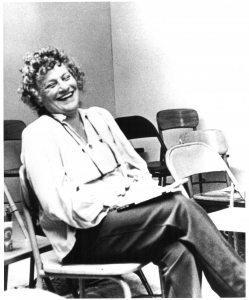“Students who regard an instructor highly will tend to adopt that instructor’s attitudes, orientations, and values. This is a seductive phenomenon because it can lead to the ego-enhancement of instructors who have not reached full psychological maturity. This ‘ego-stroking’ can then motivate instructor behaviors which do not have the personal development of participants as their primary aim. This pitfall is even wider and deeper than might be initially suspected because the instructor may be only vaguely aware or not aware at all that this is happening. Unknowingly acting for the sake of ego-enrichment instead of for educational reasons, is an insidious risk…”
Imagine twenty or thirty students all preoccupied with success or failure in a subject, bent on getting all the right answers in order to pass the subject, all wanting to please the teacher who knows all the right answers, who sits kindly or severely in judgment of all who face him/her. This could be you. It used to be me.
It was how I taught Mime for many years; by showing and having students copy me, just as I had copied my teachers and role models. I felt I was a natural born teacher and teaching was (and is) my true calling.
When I began to have success in Viola’s workshop, I wanted so much to share what I discovered and wanted to teach theater games. When I asked Viola if I could teach what I was learning she said “No!” in no uncertain terms.
“Everyone takes a few months with me and then goes out and hangs out a shingle and they never give me any credit! They become the experts!” she lamented. “They are predators! And I won’t have you taking my work like that.”
“Viola, I would never do that.” I promised. But still she refused.
The problem was I still wanted to teach and I kept after her.
“Teaching is a cleansing!” she would tell me. “You are not the know-it-all. You have to constantly watch yourself.”
“Viola, I want to teach!” I insisted.
“No!” the answer came back.
I waited. It was six years before she relented.
“All right.” She said after a party one night. “You can teach mimes and children.”
“Mimes and children?”
“Yes. Mimes can learn Space from you and children will teach you how to side coach. You can come and talk and you’ll tell me what you’re doing.”
She did not tell me that she would “show me how”. Nor did she tell me much of anything – directly. I would come by every once in a while and talk about what games I did and what games I had planned for solving certain problems with some resistant students, who weren’t ‘getting it’. I so wanted them to get it just like I did.
“You have to become a diagnostician.” She’d say. “You look for what’s going wrong and try to side-coach something that will penetrate.”
Mostly Viola would admonish me if I told her I showed them how to do something and bemoaned that they weren’t getting it. She would remind me that “Teaching is a cleansing.”
It wasn’t long before I was teaching everyone. Viola especially wanted me to teach teachers.
The Approval/Disapproval Syndrome
When teaching, we can unknowingly fall into the trap of authoritarian roles: The Strict Master, The Benevolent Dictator, or The Pedant. And the public wants that. They pay big bucks for ‘experts’.
But if we are not vigilant, we can become trapped by several different kinds of group dynamics.
One is the invisible norm of the many looking to the one, as in a typical classroom situation. This configuration automatically puts the one in front of the group into a power position and everyone else simply accepts it. Every schoolroom was set up like this to automatically promote authority in the one in front of the group.
Another is the desire of students to ‘get it right’ or ‘do it the way they think you expect’. They do this by constantly asking “How”. ‘How should I do it?’ This is path of least resistance for students and allows them to manipulate the teacher into doing the work for them. And it makes you, the teacher feel important. You take responsibility for your student’s learning. It is a subtle feeling of power. But as George Orwell so aptly points out, “Power corrupts”.
If it were a game, the game would be called “Passing the Subject” and the focus would be ‘Pleasing the Teacher’. The rules include studying, (a real involvement with the subject) but are not limited to it. There is flattery (the apple) and deceit (cheating) as well. To many it is the fear of failure that prompts rapt attention and a desire to get a good grade. This creates a relationship of dependency on the teacher. And that is very seductive.
You can easily get caught in the trap of offering your knowledge as a shortcut rather than have the student learn by doing. Magnify that by twenty or thirty or however many are in your class and that sense of power can subvert you without you even knowing it.
“A penny lecture comforts the teacher more than the student.” – Viola Spolin.
You could respond to this norm in several ways. You might become an authoritarian dictator, or a keeper of the peace, or the wise and benevolent OZ – a dispenser of knowledge and wisdom or even ‘your humble servant’: But nonetheless, you feel entrusted with the power of success or failure over your students and that’s a trap.
Unfortunately, in our culture, education continues to operate this way. Teachers do not promote peerage or mutual respect. They may talk about it, but they pass on the value that learning creates a superior status and that the prize of learning is an A.
This carries over to the workplace where bosses and workers repeat this relationship. It can also be how you relate to people in general.
Teaching is a Cleansing
There is no respect for another when there is a reward for it, for the bribe or the punishment becomes far more significant than the feeling of respect. If we have no respect for the child but merely offer him a reward or threaten him with punishment, we are encouraging acquisitiveness and fear. Because we ourselves have been brought up to act for the sake of a result, we do not see that there can be action free of the desire to gain.
from Education and the Significance of Life. J. Krishnamurti copyright 1953 HarperCollins Publishers
Intellectualization and Direct experience
In my experience as a teacher, the thrill of having had an experience makes me want to transmit that experience to others. My first instinct is to ‘understand’ the experience, relate it to my life and then ‘tell’ others about it. It might be interesting, but it is no substitute for the experience itself.
As a novice teacher, I got away with telling people about my experience then immediately went about trying to get them to have the same experience I had and in doing so, I looked for the result. It was pure ego.
‘We should not pretend to understand the world only by the intellect; we apprehend it just as much by feeling. Therefore the judgment of the intellect is, at best, only the half of truth, and must, if it be honest, also come to an understanding of its inadequacy.” Carl Gustav Jung 1875‑1961 Psychological Types [1923], conclusion, p. 628
My attempts to understand my experience while I was having it shut off all contact with the experience itself. And for the first few years in Viola’s workshop I remained in my head.
I wanted to simulate great improvisation as I saw some do with impressive quick wit and skill. And many an improv teacher invents ways to make that happen.
But that means you are not transformed by the act of improvising. You may get rewarded and applauded for it, but you remain safely in your head (past experience).
I think when you do have great moments and breakthrough experiences you want to go out immediately and share it with the world. I did. I think this happens a lot in therapy and many who’ve gone through a lot of therapy successfully become therapists.
I wanted to digest my experience so I could integrate it and describe it and then tell others how to get there.
I think that’s the impulse to teach.
 Paul Sills once warned me, when I told him I wanted to spread the work to the world. “Don’t turn this into dog food.” I knew exactly what he meant.
Paul Sills once warned me, when I told him I wanted to spread the work to the world. “Don’t turn this into dog food.” I knew exactly what he meant.
When something is indescribable, it is closer to being a direct experience. When words fail, we come closer to a union with what it is we have no words for. In those ineffable moments we glimpse the divine, the sublime, the essence of being alive. That is what Viola wanted her work to do.
If you’re a teacher, when you have those moments, you want to shout if from the rooftops and give it to the world.
But beware!
Gary Schwartz North Bend, WA Oct. 2012
[1] The Seduction of Ego-enhancement for Instructors
http://www.wilderdom.com/facilitation/InstructorEgoEnhancement.htm
Last updated: 2004
[2] I think that Keith Johnstone exploits this brilliantly in his work on Status.
